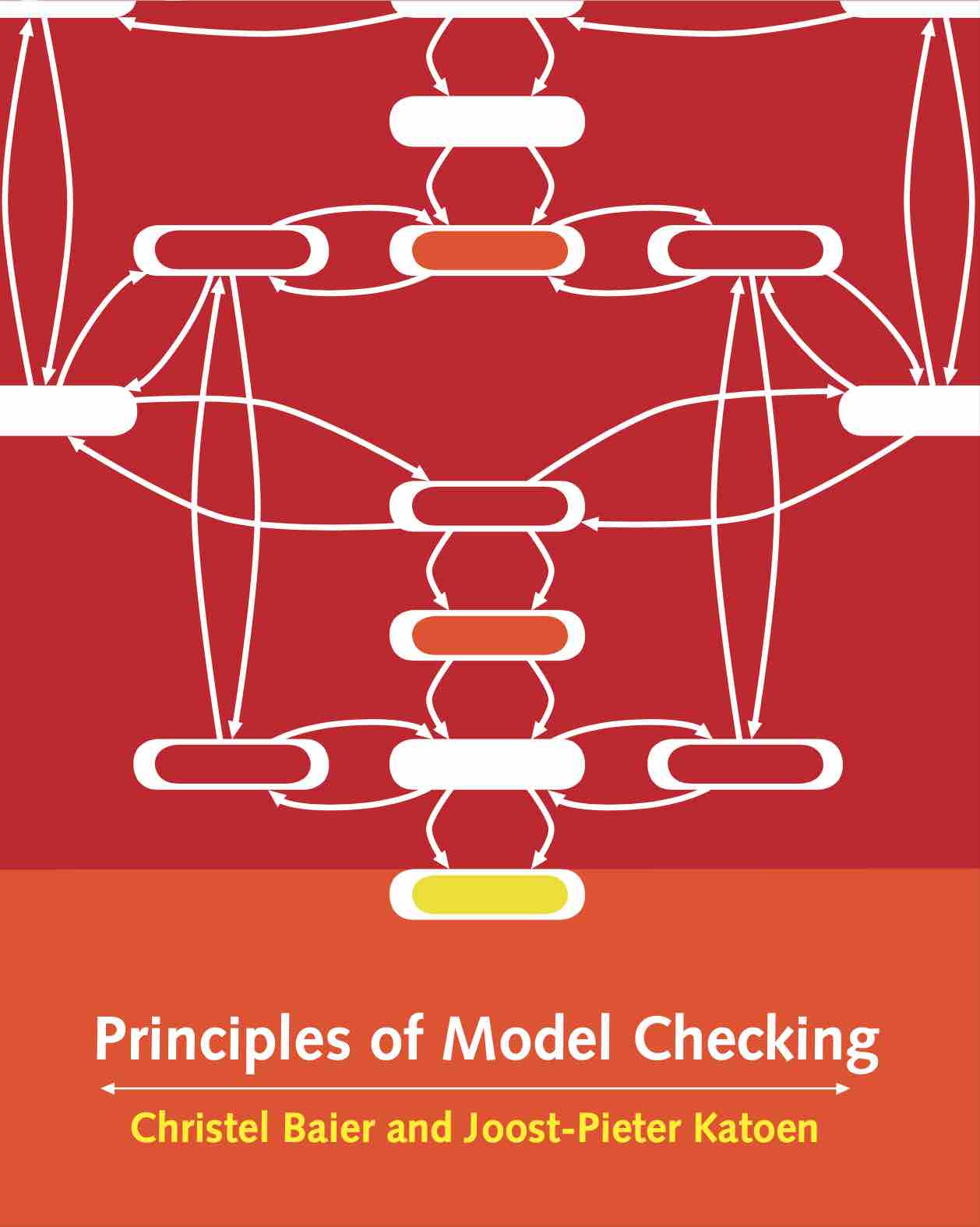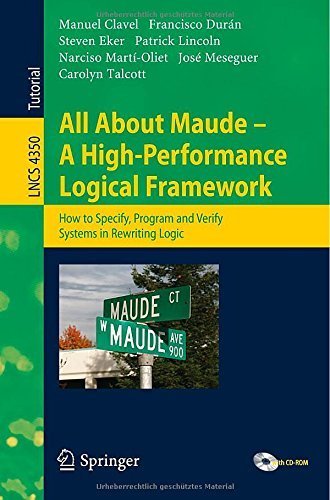Model Checking (Core Course 2025 – 26)
Lecturers
Lectures
-
Monday, January 26, 10.30–12.30, room B, Aurora.
-
Tuesday, January 27, 14.30—16.30, P-2.6, Zenith.
-
Thursday, January 29, 14.30—16.30, conference room –1, Zenith.
-
Friday, January 30, 14.30—16.30, conference room –1, Zenith.
-
Monday, February 2, 14.30—16.30, conference room –1, Zenith.
-
Tuesday, February 3, 14.30—16.30, conference room –1, Zenith.
-
Thursday, February 5, 14.30—16.30, conference room –1, Zenith.
Motivation and Preview
-
Introduction to Model Checking (Preview of Core Course)
-
slides for preview Talk, December 11, 2025 (pdf)).
Books

-
Christel Baier and Joost-Pieter Katoen:
Principles of Model Checking,
MIT Press, 2008.
-
A pdf version of the book can be found on the internet.

-
Manuel Clavel, Francisco Durán, Steven Eker, Patrick Lincoln, Narciso Martí-Oliet, José Meseguer, Carolyn Talcott:
All about Maude — A High-Performance Logical Framework
(How to Specify, Program and Verify Systems in Rewrite Logic),
Springer Verlag.
Links to Resources
-
Maude (formal reasoning tool):
-
Webinterface
LTL 2 BA : fast translation from LTL formulae to Büchi automata
for tool LTL2BA by Denis Oddoux
using a technique of his and Paul Gastin.
- Further reading:
-
partial model checking
[notes 2024 (pdf)]
-
the research paper
Partial Model Checking and Partial Model Synthesis
in LTL Using a Tableau-Based Approach
(link) by Serenella Cerrito, Valentin Goranko, Sophie Paillocher at FSCD 2023 on partial model checking
-
modal μ–calculus
-
book chapter
The mu-calculus and model-checking
(link)
by
Julian Bradfield and Igor Wałukiewicz.
Lectures
-
Introduction
[slides handout (pdf),
slides (pdf) of Lecture 1].
-
motivation for model checking
-
difference with simulation and testing
-
glance at model checking with temporal logics
-
motivating example of three processes working on a counter: program graph and labeled transition system, formulas of LTL and CTL
-
Example Maude code for the three processes that work on a counter
-
exam options
-
Modeling by labeled transition systems
[notes (pdf) of Lecture 2]
-
definition
-
examples: beverage vending machine, traffic lights, dining philosophers
-
non-determinism: action-deterministic, AP-deterministic LTSs
-
handshaking communication of LTSs
-
execution fragments and traces of LTSs
-
Linear-Time Behavior & Properties
[notes (pdf) of Lecture 3]
-
path fragments and paths
-
invariant, safety, and liveness properties
-
every LT-property is the intersection of a safety and a liveness property
-
fairness properties
-
Linear Temporal Logic (LTL), and exercises Linear-Time Properties and Fairness
- exercises
-
vending machines example for trace inclusion
example trace inclusion [note (pdf)]
-
studying fairness, strong fairness, and weak fairness for an example suggested by Gabriele
[note (pdf)]
- LTL
[notes of Lecture 5 (pdf) of Lecture 3]
-
syntax and semantics
-
derived modalities, equivalence of formulas
-
interpretation in a transition system
-
concrete examples
-
Linear Temporal Logic (LTL), continued
[notes
(pdf)]
-
Weak Until modality W
-
permits to express the negation of Until U
-
duality between modalities W and U
[notes
(pdf)]
-
permits to write LTL formulas in positive normal form
-
Fairness in LTL
-
unconditional, weak, and strong fairness conditions expressed by LTL-formulas
-
fair satisfiability based on fair paths
-
subjecting an LTL formula Ψ to a
fairness conditions fair
can be expressed as the implicative
LTL formula
( fair ⇒ Ψ ).
-
model checking LTL formulas
-
example of model checking "by hand" (Exercise 5.2 in the book)
-
express properties by (generalized) Büchi automata
- examples of translations of LTL formulas ( □ ◇ a ("always eventually a") and ◇ □ a ("eventually always a") ) as non-deterministic Büchi automata
-
LTL (continued), Computation Tree Logic (CTL)
-
LTL model checking
[notes LTL model checking (pdf)]
-
the modality "release" expressed via weak until W
-
non-deterministic Büchi automata for the until modality U and the weak-until modality W
-
model checking transition systems and properties via product automata
- LTL model checking algorithm
-
algorithm schematically
- example from the book (Pedestrian traffic light, property infiitely often green)
-
Computation Tree Logic (CTL)
[notes CTL (pdf)]
-
syntax and semantics
-
examples
- Extensions of CTL
- CTL+
-
is equally expressibe as CTL (proof idea via translation of CTL+ formulas into CTL formulas
-
CTL*
-
is more expressive as CTL
-
encompasses LTL by starting with a ∀ path quatifier
-
LTL model checking with Maude, CTL model checking algorithm, and complexity LTL/CTL model checking
[notes Lecture 7 (pdf)]
-
Webinterface
LTL 2 BA : fast translation from LTL formulae to Büchi automata
for tool LTL2BA by Denis Oddoux
using a technique of his and Paul Gastin.
-
LTL model checking with Maude: the River Crossing Problem.
-
CTL model checking
-
Existential normal form (ENF) of CTL formulas
- inductive clauses for set satisfiability sets
Sat(true), Sat(p), Sat(¬Φ), Sat(Φ1∧Φ2), Sat(∃○ ◯ Φ), Sat(∃ΦUΨ), Sat(∃□Φ).
-
least fixed-point definition of ∃ΦUΨ,
-
greatest fixed point definition of ∃□Φ.
-
complexity of model-checking algorithms in comparison:
-
model checking of LTL formulas Φ in transition systems TS is PSPACE complete, with upper bound O(|TS|.2|Φ|) ;
-
model checking of CTL formulas Φ in transition systems TS is in PTIME with complexity O(|TS|.|Φ|) ;
-
model checking of a μ-calculus formula Φ in transition systems TS is in NP ∩ co-NP.
Clemens Grabmayer
/
www:
https://clegra.github.io
/
mailto:
c one dot
a one dot
grabmayer one at
gmail one dot
com
/
Last modified: Tue 10 Feb 2026 15:38 CST
/ /
/

